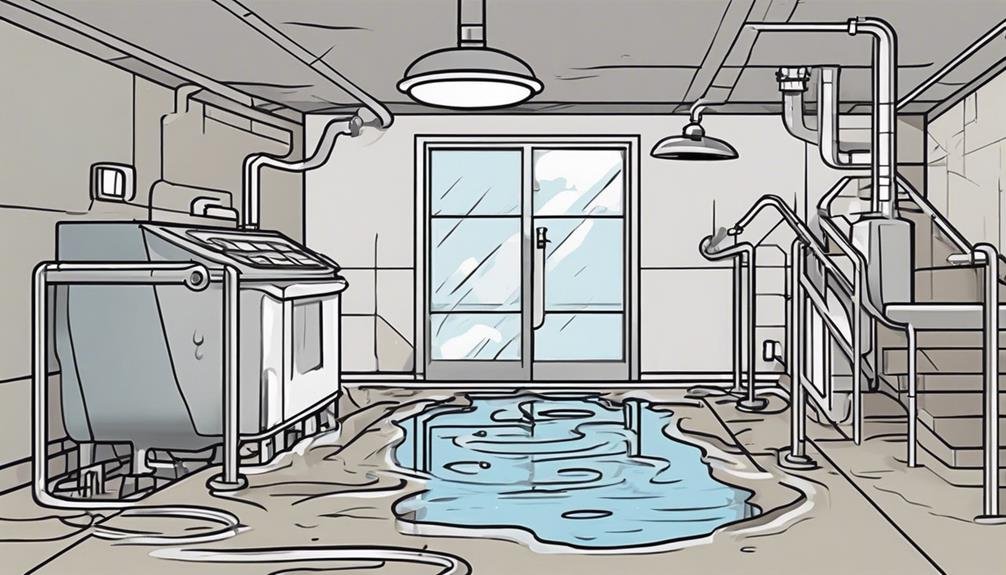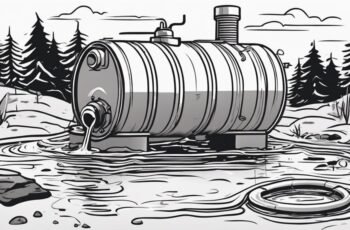You might not realize that your septic tank requires cleaning until it's too late. Foul odors lingering around your property could be the first warning sign that something is amiss below the surface. Slow draining fixtures and unexpected patches of lush green grass in your yard could also be indicators of a full septic tank.
But what about the sounds coming from your plumbing? And the worst-case scenario – sewage backing up into your home. Stay informed to avoid potential septic system disasters.
Key Takeaways
- Foul odors and sewage backup indicate urgent septic tank issues.
- Slow draining fixtures signal potential septic system problems.
- Lush green patches in the yard may signify septic system issues.
- Gurgling sounds in plumbing hint at plumbing and septic concerns.
Foul Odors Around Your Property

If foul odors linger persistently around your property, it could be a clear indicator that your septic tank requires immediate cleaning. Septic tank maintenance is crucial to prevent leaks and ensure the proper functioning of your system. Foul odors typically indicate that there's a leak or a buildup of waste in your septic tank. Detecting leaks early is essential to avoid costly repairs and environmental contamination.
To address the issue of foul odors, start by inspecting your property for any signs of standing water or soggy ground around the septic tank area. This could indicate a leak that's causing the unpleasant smells. Additionally, make sure to check for any sewage backup in your drains, as this could also be a sign of a septic tank problem.
Regular septic tank maintenance, such as pumping and inspections, is key to preventing leaks and foul odors. By staying proactive and addressing any issues promptly, you can ensure that your septic system functions properly and avoid potential health hazards.
Slow Draining Fixtures
Persistent foul odors around your property may not be the only sign that your septic tank needs attention; slow draining fixtures can also indicate potential issues with your system. When you notice water taking longer than usual to drain from sinks, showers, or toilets, it's essential to address the problem promptly to prevent further damage to your septic system.
Here are some key points to consider:
Maintenance Tips:
- Regular Pumping: Schedule regular septic tank pump-outs every 3-5 years to prevent buildup and ensure proper functioning.
- Avoid Harsh Chemicals: Refrain from using harsh chemicals that can disrupt the natural balance of bacteria in the septic tank.
- Inspect Drain Field: Regularly inspect the drain field for any signs of standing water or odors, which could indicate a problem with the drainage system.
Common Causes:
- Excessive Grease Buildup: Pouring grease down the drain can lead to clogs and slow drainage.
- Solid Waste Accumulation: Flushing non-biodegradable items or excessive toilet paper can cause blockages.
- Tree Root Intrusions: Tree roots can infiltrate pipes, causing obstructions and slow drainage.
Lush Green Patches in Yard

When observing lush green patches in your yard, it could be an indication of potential septic system issues that require attention. These patches may seem like a good sign of healthy grass growth at first glance, but they can actually signal underlying problems. Soil saturation is a common cause of these vibrant patches, indicating that your septic system might be leaking and saturating the soil with excess nutrients.
Excessive algae growth in nearby water bodies can also be linked to septic tank issues indicated by lush green patches. When the septic system isn't functioning correctly, it can lead to nutrient-rich wastewater seeping into the soil and eventually reaching water sources, causing algae blooms due to the abundance of nutrients.
If you notice these patches in your yard, it's crucial to address the potential septic system concerns promptly. Ignoring these signs could lead to more significant issues with your septic system and potentially harm the environment.
Gurgling Sounds in Plumbing
Gurgling sounds in your plumbing system often indicate potential issues that need to be addressed promptly to prevent further damage. These sounds are typically caused by air bubbles forcing their way through water in the drain pipes, signaling a blockage or improper venting.
Here are some key points to consider:
- DIY solutions: In some cases, gurgling sounds can be resolved with simple DIY methods. Try using a plunger to clear minor clogs or pouring hot water down the drain to break up grease buildup. Additionally, using a mixture of baking soda and vinegar can help break down organic materials causing the blockage.
- Professional services: If the gurgling persists even after attempting DIY solutions, it may be time to seek professional help. A licensed plumber can inspect your plumbing system, identify the root cause of the issue, and provide appropriate solutions. They've the expertise and tools to tackle more complex problems efficiently.
Addressing gurgling sounds promptly can prevent more severe plumbing issues down the line.
Sewage Backup in Home

Experiencing sewage backup in your home can be a distressing and urgent issue that requires immediate attention to prevent further damage and health hazards. If you notice water or waste backing up into sinks, toilets, or showers, it could indicate a potential problem with your septic tank. In such cases, it's crucial to address the issue promptly to avoid contamination and potential health risks.
To tackle sewage backup effectively, consider seeking a professional inspection of your septic system. Professionals can identify the root cause of the backup and recommend the necessary repairs or maintenance. Additionally, regular professional inspections can help prevent future incidents and ensure your septic system functions properly.
In addition to professional inspections, proactive DIY maintenance can also help prevent sewage backups. Simple measures like avoiding flushing non-biodegradable items, monitoring water usage, and being cautious of what goes down the drain can contribute to a healthier septic system. By staying vigilant and addressing any signs of sewage backup promptly, you can maintain a well-functioning septic system and a clean home environment.
Conclusion
So, if you're noticing foul odors, slow drains, lush green patches, gurgling sounds, or sewage backups, it's time to get your septic tank cleaned.
Just like a well-oiled machine, your septic tank needs regular maintenance to keep things running smoothly.
Don't wait until it's too late – take care of your septic system before it becomes a stinky situation!

